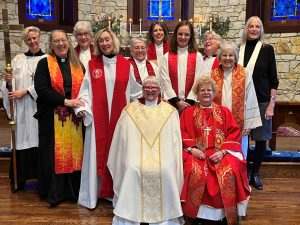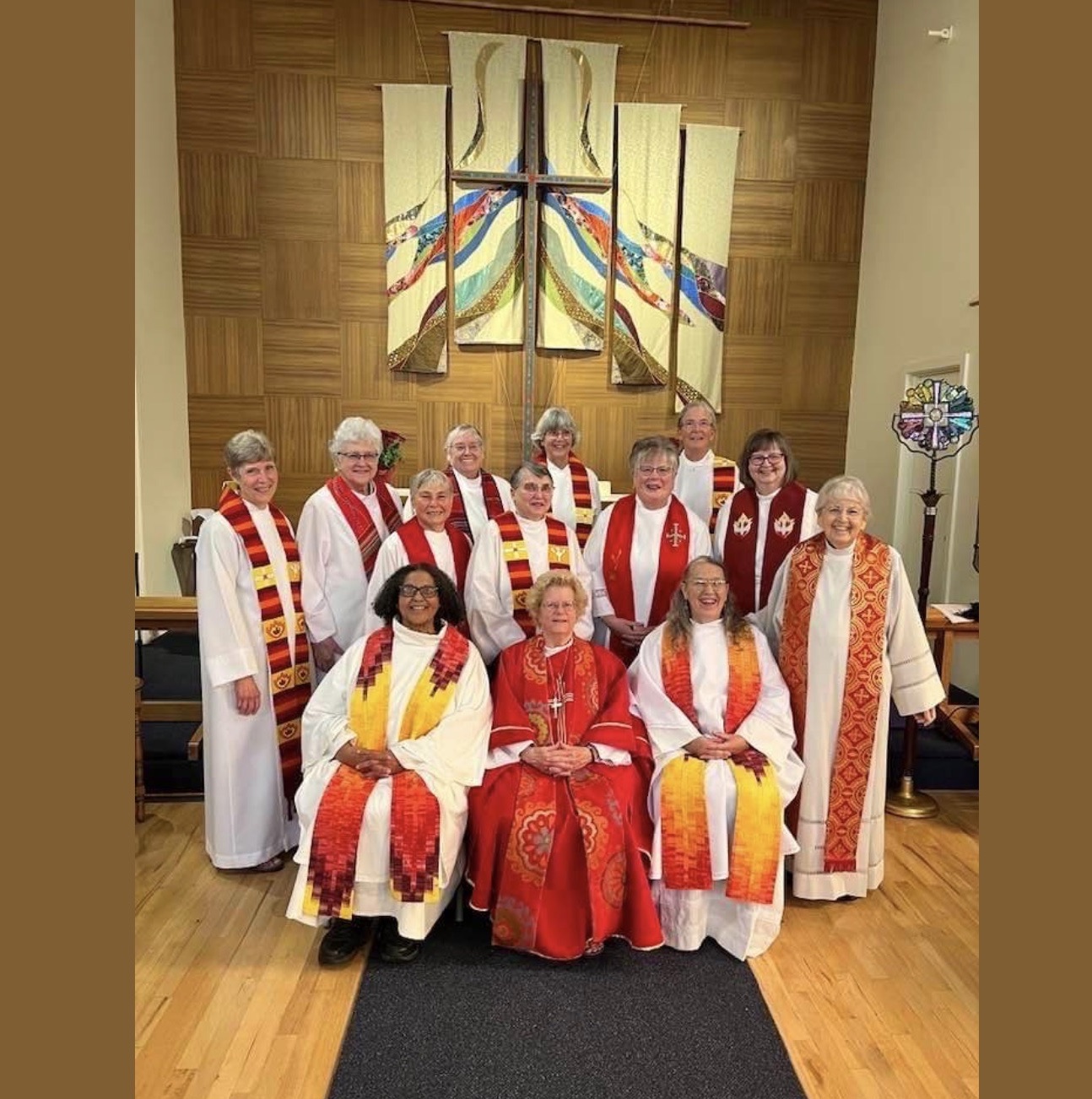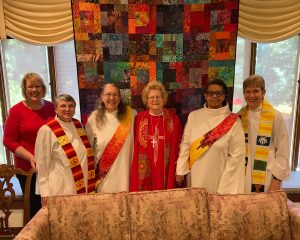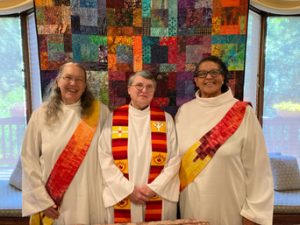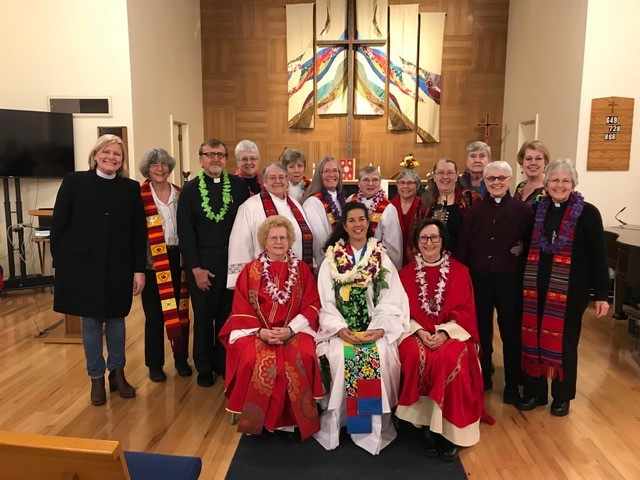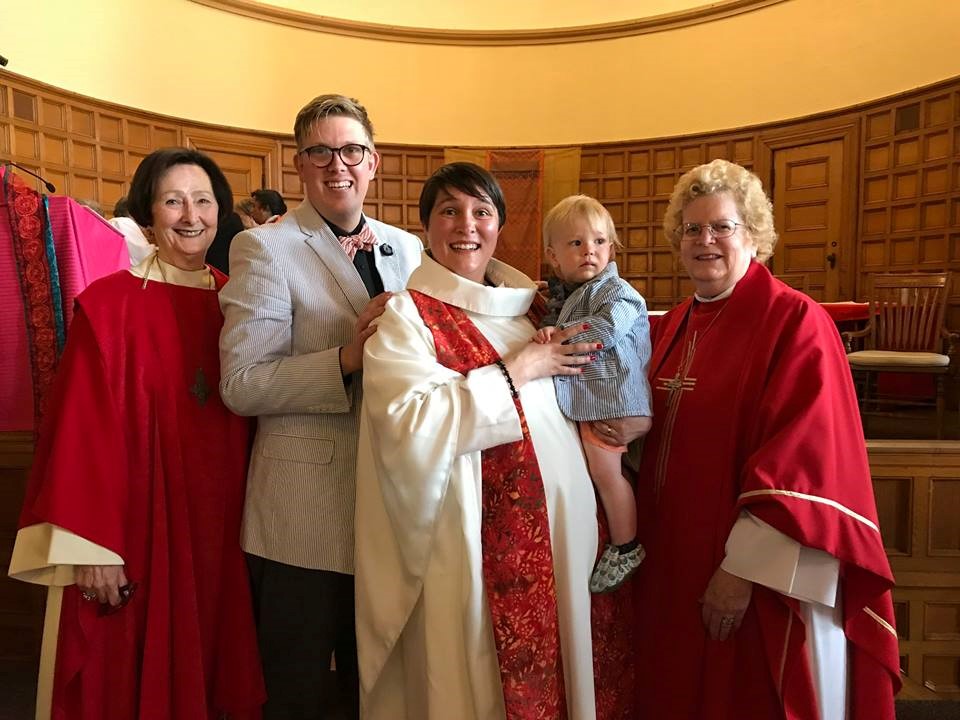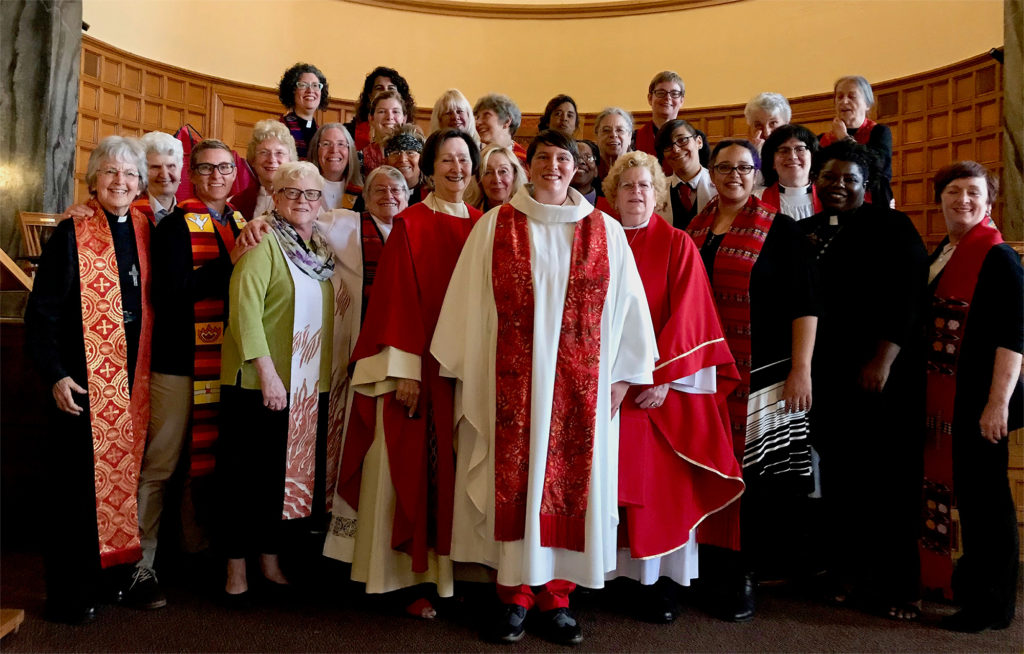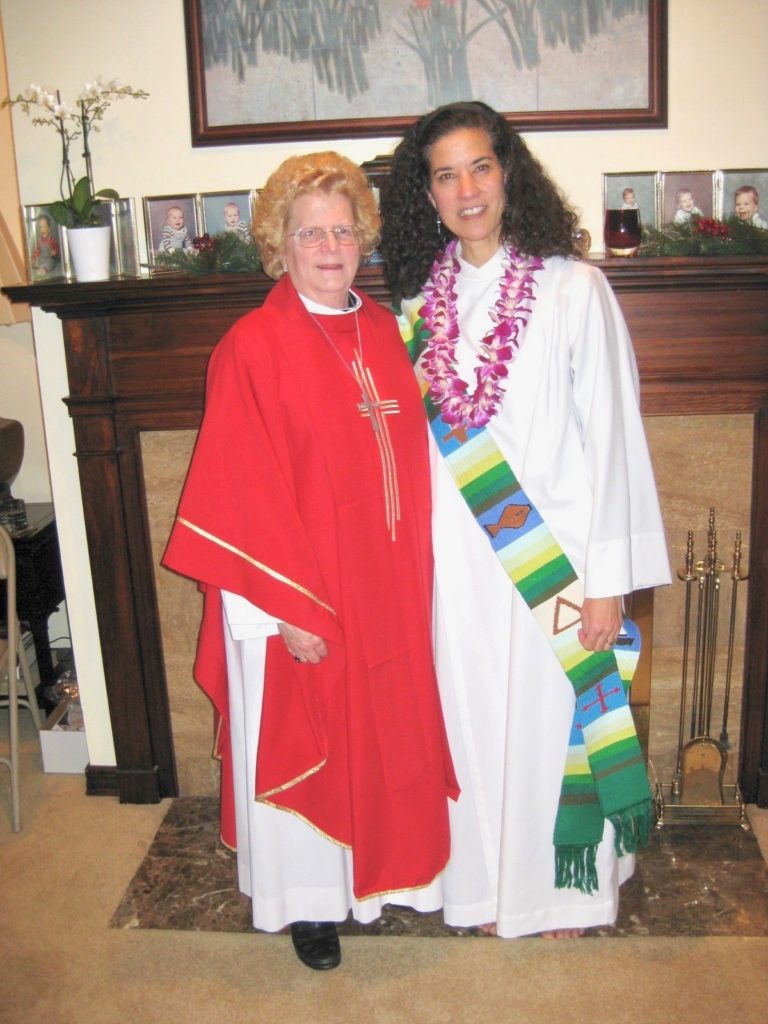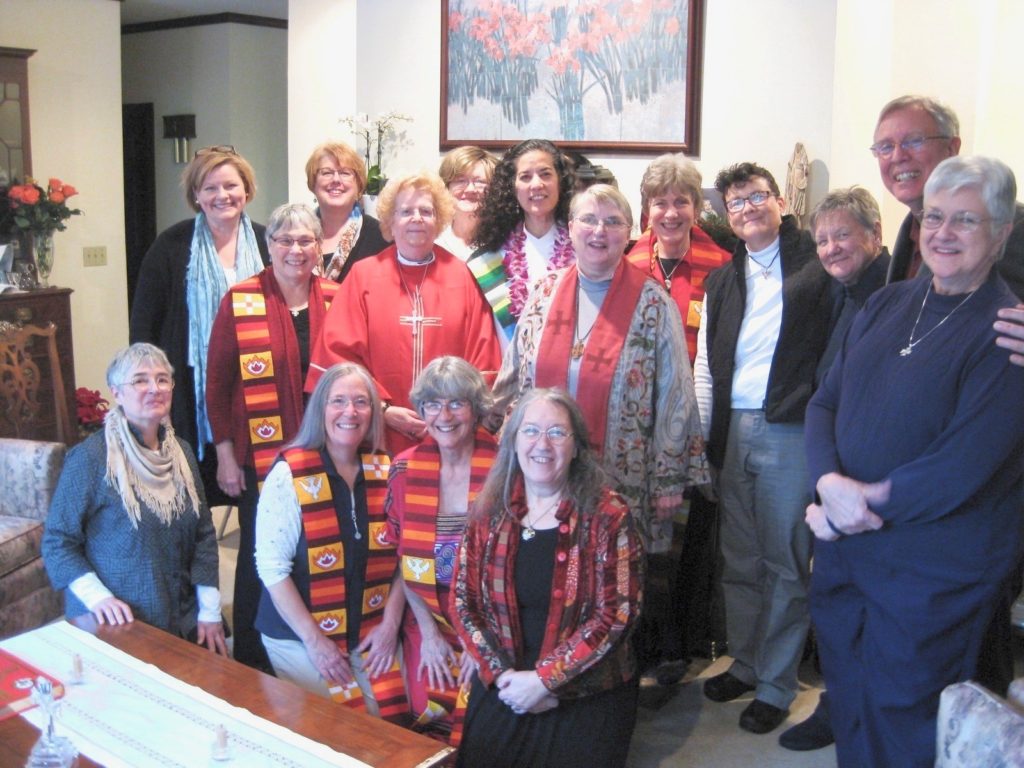Ordinations
January 20,2024
Priest Ordination of Karla Jensen
Karla Jensen
Grace Episcopal Church
St. Helena, California
September 10, 2022
Priest Ordination
Vieda Baker and Denise Bernt
Ordination Highlights of 2020-2021
July 18, 2021
Diaconate Ordination of Vieda Baker and Denise Bernt
Portland, Oregon ________________________________________________________________________
February 1, 2020
Priest Ordination of Kori Pacyniak
San Diego, California
Highlights of 2018-2019 Ordinations
January 23, 2019
Priest Ordination of Puanani Lalakea
Portland, Oregon
Presiding Bishops: +Suzanne Thiel and +Jane via
Setting: Mt. Carmel Lutheran Church
Highlights: Puanani was presented with a lei and attendees were also given leis to wear for the ordination. Spirit of Grace (Catholic Lutheran) Church community were present. Reception held in private Thiel home.
April 7, 2018
Priest Ordination of Christine Haider-Winnett
Oakland, California
No one can take my faith from me. Not even the Pope.
by
Christine Haider-Winnett
(The Establishment)
Last April, I was ordained a Roman Catholic priest.
The ordination would have looked familiar to anyone who had attended a Catholic ordination before. Scripture was read, a homily was delivered, and we sang the Litany of the Saints. After my bishops laid their hands on me, and I received my stole and chasuble, we celebrated communion together.
But there were a few significant differences between my ordination and most other Catholic ordinations: I, my bishops, and most of the people participating in the liturgy, were women. Instead of calling God “Lord” or “King,” we used names like “Midwife” and “Wisdom Sophia” to describe the Divine. Instead of praying to “Our Father” we prayed to God who is “our Mother and Father.”
I am an ordained priest through Roman Catholic Women Priests, a movement of women ordained according to apostolic succession and Roman Catholic tradition, but whose ordinations are considered illegal by the Vatican.
Roman Catholic Women Priests were first ordained in Europe in 2002. Seven brave Catholic women, with the support of their communities, decided that after years of advocating for women’s ordination, it was time to stop waiting. They would have to go forward with ordination without the blessing of the Vatican. After studying, praying and discerning this next step together, they were ordained on a boat on the Danube River by Catholic bishops acting in defiance of the Vatican.
A year later, two of those women were ordained as bishops, which enabled Roman Catholic Women Priests to ordain our own priests (rather than relying on the generosity of male bishops). Now, there are currently eight bishops and over 100 priests serving in Roman Catholic Women Priests, USA, as well as priests in Europe, Latin America, Canada, and beyond. We are married, single and divorced, and of diverse sexual orientations, ages and backgrounds. We serve as chaplains, spiritual directors, pastors, artists, and social justice activists.
The price for being an ordained Catholic woman has been high. In 2008, the Vatican issued a decree stating that all ordained women would be excommunicated “latae sententiae” (automatically and without trial). This sort of blanket excommunication is not even given to priests convicted of child molestation, but it is imposed upon hundreds of faithful women who are brave enough to follow God’s call.
So, why did I decide to be ordained, knowing what it would cost me? In an age when more and more people are calling themselves “spiritual but not religious” and “ex-Catholic,” why would I choose to dedicate my life to serving a dying institution that doesn’t seem to want me as a member?
I am sure that if you asked a dozen different Roman Catholic Woman Priests that question, you would get a dozen different answers. (Though you might have a surprising number of them tell you about the time that they dressed in their mothers’ bathrobe as a child and tried to baptize the pet cat.) For me, it didn’t feel like a choice.
Or at least, I didn’t choose to be ordained in the same way that I chose what I was going to eat for breakfast this morning, or what I’m going to do this weekend. Like any other priest, I discerned a call to ordained ministry, which means that I spent years praying and asking if this was God’s true call for me. That discernment felt similar to the time I decided to marry my husband, or when we decided to have a child. It was bigger than making a choice, and more complicated than simply “wanting to.” Deciding to be ordained felt like saying “yes” to a longing that began deep in my soul — a longing that I would say my Mother God placed in my heart at birth.
I first realized that I felt a call to ordination at 13, while sitting in a pew at my small-town Catholic parish. I remember feeling certainty that God would not place in my heart a call that could not be fulfilled. It was 1996 in Southern California, and every Catholic I knew supported women’s leadership in our church. As a Girl Scout being raised by a single mother, I had been taught to believe that girls could do anything that boys could do. I knew that the Catholic Church forbid women’s ordination, but that seemed to be a hold-over from an aging generation that was destined to change. I couldn’t imagine that by the time I grew up, the ban on women’s ordination would still be in place.
As I got older, I realized that the institutional Roman Catholic Church would likely never recognize my call to ordained ministry. When I was 15, right before I was scheduled to celebrate my confirmation, I left the Catholic Church and spent 10 years worshiping with other faith traditions. I became a member at a Unitarian Universalist church, graduated from a Quaker College, and attended mass occasionally at a local Episcopal parish. I learned a lot from those denominations and encountered so much beauty in their churches, but it was clear that my first language—my first love—was Catholicism. I never feel as comfortable or connected to the spirit as I do in a Catholic community. I started to realize that I wasn’t just called to ordained ministry—I was called to be an ordained Catholic priest.
At the age of 25, I finally “came home” and was confirmed into the Catholic Church. I came back more certain than ever that God was calling me—and other women—to the priesthood, but I was unsure about what that meant for my place in the Church. Luckily, it didn’t take long for me to realize that I wasn’t alone. I discovered that there is a whole community of Catholics out there who are trying to make their Church reflect Jesus’ values of inclusivity, equality, and justice. It was in this progressive Catholic community that I finally found my home.
Since I came back to the Catholic Church a decade ago, I have dedicated my life to making my church live up to the best of its values, rather than the worst of its prejudices. As Communications Manager at Catholic justice organization, Call To Action, I meet Catholics every day whose faith is inspiring them to work for a more just Catholic Church. It is these faithful activists and dissidents that have kept me Catholic, but working with them has also taught me how far our Church has to go before it can be a welcoming place for women, LGBTQ folks, and others who have been told by the hierarchy that the Church isn’t “for” them. In the end, I didn’t decide to become a priest simply because I felt a call to ordination. I became a priest because I know that Catholics urgently need women priests.
The ban on women’s ordination hurts everyone—not just women called to ordained ministry. Catholic teaching on everything from abortion to economics, and gender identity to Mary’s virginity, is decided by (supposedly) celibate men who have no understanding of women’s lived experiences. As long as the Vatican is an old boy’s club, the teachings that come out of it will have a real, damaging impact on women’s lives.
And it’s not just the Vatican. The message that men’s bodies are holier than women’s is reinforced every time a woman is barred from acting ”in persona Christi” (in the place of Christ) at the communion table. It’s reinforced every time exclusively male language is used to describe God, every time women’s stories are left out of our scripture readings.
Women deserve a church where we can see a body like ours break bread at the altar. We have the right to tell our confessions to a priest who understands our lived experiences, and to hear God called names that uphold Her feminine (as well as masculine and gender non-conforming) qualities.
I hope that my priesthood will be a reminder that women are also created in the image of the Divine. I want to preach from stories that are relatable to women’s lived experiences, and offer pastoral care that is sensitive to their needs. I want my visibility to help make the way easier for priests of all genders, sexualities, abilities, and races, so that the Catholic priesthood can finally reflect the full diversity of the People of God.
As an excommunicated woman, I am no longer welcome to take communion in the churches that raised me and nourished me. I face a lifetime of difficulty finding work as someone in professional ministry who was excommunicated by the Catholic Church — probably the largest faith-based employer in the world. Most of all, I worry what impact my excommunication will have on my young child’s relationship with the Catholic Church, and his larger faith life.
While I am pained that my brothers in Rome would try to cut me out of the Church for following my conscience, I know in my heart that this excommunication is not valid. Even the Vatican agrees that nothing, even excommunication, can remove my baptism (Cannon Law 1272). Excommunication is simply Rome’s way of disinviting me from the family reunion, but they can’t change the fact that I am part of their family — and they are part of mine. The Catholic Church will forever be a part of me and, whether the men in the Vatican like it or not, I will be a part of it.
I will continue to pray for the Pope and consider him to be part of my family. However, he is simply wrong about the ordination of women. Contrary to popular belief, no pope has ever issued an infallible statement on women’s ordination (papal infallibility only applies to a select few statements, primarily dealing with dogma). In the end, Pope Francis is simply a man whose lack of experience with women leaders has given him a limited understanding of what women are capable of. I can no longer allow myself to deny God’s call simply because of his own limitations. To me, being obedient to the Spirit is more important than obedience to any one person.
Rather than silencing me, my excommunication inspires me to serve people who have felt marginalized by the Church in the same way that I have. I want to build a Church where all people are equally welcome to share their whole selves, regardless of gender, sexuality, or any other factor. I want to serve people who love their faith but who have been harmed by the Church: feminist and divorced and pro-choice and queer and gender non-conforming people who have always been part of the rich tapestry of our Universal Church, but who for too long have been treated like a burden to our parishes rather than a blessing.
Dr. Clarissa Pinkola Estes calls this diverse tapestry of Catholic renegades the “Church Beneath the Church,” and I find it to be so much more vibrant than the “upstairs” Church. While the Institutional Church continues to face rising scandals and lowered church attendance, the Church Beneath the Church serves God’s people in Call To Action chapters and conferences, Catholic Worker houses, home churches, and communities served by Roman Catholic Woman priests across the globe. The Vatican may have excommunicated me, but it is this larger Catholic community that has called me and claimed me as part of them.
I am honored to be able to serve as their priest.
January 26, 2018
Diaconate Ordination of Puanani Lalakea
Portland, Oregon
For current news and articles related to the women’s ordination movement and renewal of the Catholic Church, please visit our Facebook, Twitter, Bridget Mary’s Blog and Judy's Blog. Bridget Mary’s Blog, Judy's Blog, and the Association of Roman Catholic Womenpriests operate independently of Roman Catholic Womenpriests-USA, Inc. The third party blogs are for informational purposes only. For semi-monthly news relating to the RCWP in Canada see RCWP Canada's publication, The Review, at rcwpcanada.altervista.org
This website was created and is maintained by Roman Catholic Womenpriests-USA, Inc. (RCWP-USA, Inc.), a California 501 (c) 3 non-profit corporation, as an educational and informational service to the public. RCWP-USA, Inc. promotes and supports the ordination of women and men in a renewed priestly ministry in the Roman Catholic Church. This website provides information about the Western Region of RCWP. Every ministry convened by a RCWP member operates separately and independently from Roman Catholic Womenpriests-USA, Inc. RCWP-USA, Inc. disclaims any responsibility for the operation of these ministries. The biographical information and descriptions of the ministries are for informational purposes only. This website also contains links to third party sites. Such links do not constitute or imply an endorsement and/or sponsorship by RCWP-USA, Inc. RCWP-USA, Inc. is not responsible for such third party websites and is not liable for the contents therein.
© 2024 Roman Catholic Womenpriests-USA, Inc.

